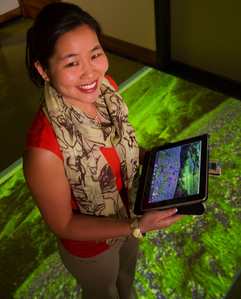Second Lunch of the Semester Brings Audrey St. John

Oh, what a belated blog post!
On Tuesday, March 10th, Prof. Audrey St. John (UMass PhD ‘08) gave a two-part talk on her research in rigidity theory (a branch of computational geometry) and running a research program with undergraduates.
17 members attended, including 13 graduate students, 2 undergraduate students, one faculty member and one staff member.
Rigidity Theory for Robotics, Drug Design and CAD

When designing a bridge, how can we minimize the amount of building materials while maintaining stability? Are there computational tools that can help predict protein flexibility, a key component in drug design? Rigidity theory seeks to answer these questions by studying structural properties from mathematical and computational perspectives. In this talk, I will discuss the fundamental questions considered by rigidity theory and its applications, including those in robotics, structural biology and Computer Aided Design for mechanical engineers.
Searching for a Career Path
A career path is exactly that: a path (and not a shortest path!). Search and traversal of it is a lot like what you learn about in Algorithms and AI: you’re discovering new nodes and edges, and you’re trying to define the function to optimize. I’ll talk about my own pathway to my current position, the choices I’ve made and why I would make them again.
#Bio
 Audrey St. John is an Associate Professor of Computer Science at Mount Holyoke College. Her research is motivated by computational challenges arising in robotics, biology and Computer Aided Design; in 2013, she received a Faculty Early Career Development (CAREER) award from the National Science Foundation (NSF). St. John earned a B.A. in Computer Science and Mathematics from Wellesley College (Summa Cum Laude, Honors in CS), followed by an M.S. and Ph.D. in Computer Science from UMass Amherst (her graduate work was partially supported by an NSF Graduate Research Fellowship).
Audrey St. John is an Associate Professor of Computer Science at Mount Holyoke College. Her research is motivated by computational challenges arising in robotics, biology and Computer Aided Design; in 2013, she received a Faculty Early Career Development (CAREER) award from the National Science Foundation (NSF). St. John earned a B.A. in Computer Science and Mathematics from Wellesley College (Summa Cum Laude, Honors in CS), followed by an M.S. and Ph.D. in Computer Science from UMass Amherst (her graduate work was partially supported by an NSF Graduate Research Fellowship).